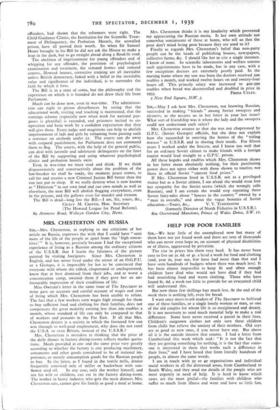MRS. CHESTERTON ON RUSSIA
SIR,—Mrs. Chesterton, in replying to my criticisms of her article on Russia, expresses the wish that I could have " seen more of the life of the people as apart from the high execu- tives.' " It is, however, precisely because I had the exceptional experience of living as a Russian among the ordinary citizens of the U.S.S.R. that I learnt the falseness of the picture painted by visiting foreigners. Since Mrs. Chesterton is English, and has never lived under the terror of an O.G.P.U. or a Gestapo, it is impossible for her to be convinced that everyone with whom she talked, chaperoned or unchaperoned, knew that at best dismissal from their jobs, and at worst a concentration camp, awaited them if they gave her an un- favourable impression of their conditions of life.
Miss Owtram's letter in the same issue of The Spectator as mine gave an accurate and careful account of wages and cost of living which Mrs. Chesterton has been unable to refute. The fact that a few workers earn wages high enough for them to buy sufficient food and clothing for their families, does not compensate the great majority earning less than 200 roubles a month, whose standard of life can only be compared to that of workers and peasants in the Far East. If all that Mrs. Chesterton desires is a society in which the favoured few can win through to well-paid employment, why does she not extol the U.S.A. or even Britain, instead of the U.S.S.R.?
Mrs. Chesterton is mistaken in thinking that the price of the daily dinner in factory dining-rooms reflects market quota- tions. Meals provided at one and the same price vary greatly according to whether the factory is one producing machinery, armaments and other goods considered to be of national im- portance, or merely consumption goods for the Russian people to buy. In the latter, as I found in the textile mills, dinner frequently consisted only of millet or buckwheat with sun-
flower seed oil. In any case, only the worker himself, and not his wife or children, can eat in the factory dining-room. The worker in heavy industry who gets the meat dinners Mrs. Chesterton eats, cannot give his family as good a meal at home. Mrs. Chesterton thinks it is my insularity which prevented my appreciating the Russian menu. Is her own attitude not somewhat reminiscent of those at home, who tell us that the poor don't mind being poor because they are used to it?
Finally as regards Mrs. Chesterton's belief that non-party people can be the heads of publishing houses, newspapers, collective farms, &c. I should like her to cite a single instance. I know of none. In scientific laboratories and welfare centres such appointments have to be made, but in any case, with a few exceptions doctors are extremely poorly paid. In the nursing home where my son was born the doctors received 200 roubles a month, and worked twelve hours on and twenty-four hours off. This princely salary was increased to 400-500 roubles when bread was decontrolled and doubled in price in
Sut,—May I ask how Mrs. Chesterton, not knowing Russian, succeeded in making " friends " among Soviet sweepers and cleaners, as she assures us in her letter in your last issue? What sort of friendship was it where the lady and the sweepers could not understand each other?
Mrs. Chesterton assures us that she was not chaperoned by G.P.U. (Soviet Gestapo) officials, but she does not explain how she succeeded in entering the homes of the " toiling masses " in U.S.S.R. and in sharing their meals. For fifteen years I worked under the Soviets, and. I know too well that for an ordinary Soviet citizen to make friends with a foreign tourist would lead straight to a G.P.U. prison.
All these kopeks and roubles which Mrs. Chesterton shows in her letter mean absolutely nothing, for their purchasing power does not agree either with those shown to tourists nor those in official Soviet " current food prices."
If Mrs. Chesterton lived in U.S.S.R. not as a privileged visitor but as a Soviet citizen, I am afraid she would soon lose her sympathy for the Soviet menu (which she wrongly calls Russian), and I am certain she would stop repeating these Soviet fairy-tales about " houses in the country " owned by a " man in overalls," and about the vague beauties of Soviet
education.—Yours, &c., V. V. TCHERNAVIN (formerly Director of North Fisheries in U.S.S.R.). Boa Overstrand Mansions, Prince of Wales Drive, S.W.












































 Previous page
Previous page